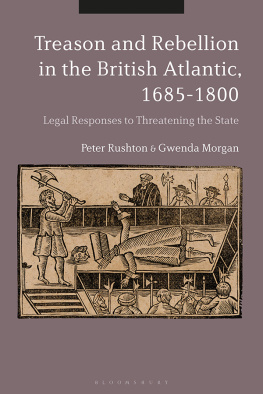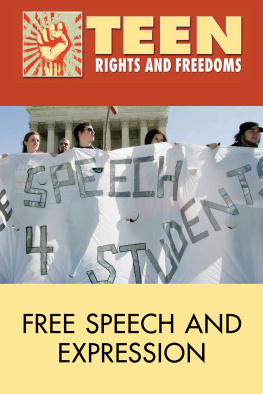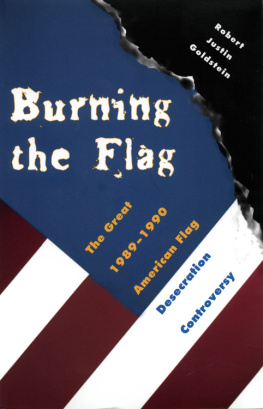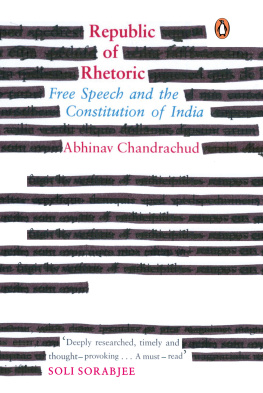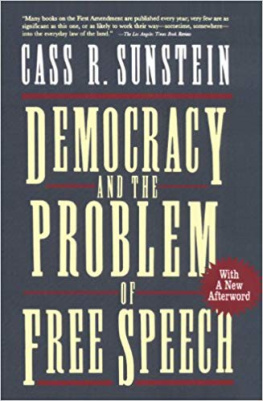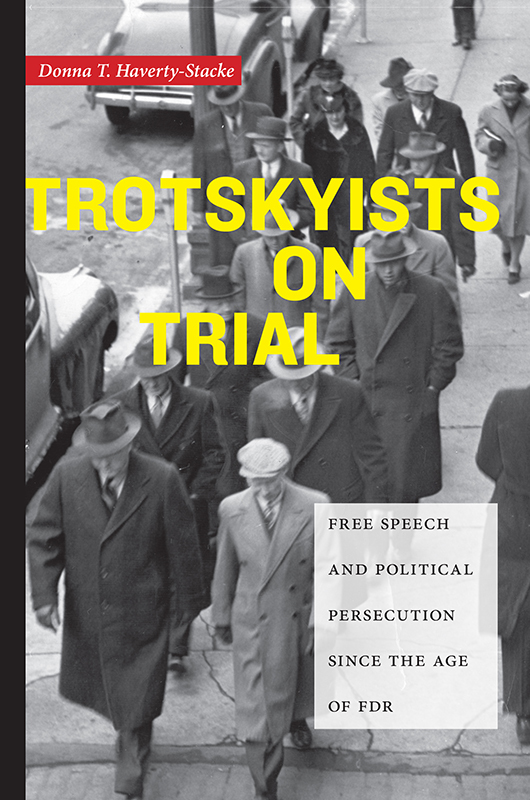
Trotskyists on Trial
Culture, Labor, History Series
General Editors: Daniel Bender and Kimberley L. Phillips
The Forests Gave Way before Them: The Impact of African Workers on the Anglo-American World, 16501850
Frederick C. Knight
Unknown Class: Undercover Investigations of American Work and Poverty from the Progressive Era to the Present
Mark Pittenger
Steel Barrio: The Great Mexican Migration to South Chicago, 19151940
Michael D. Innis-Jimnez
Ordering Coal: Railroads, Miners, and Disorder in the Gilded Age, 18701900
Andrew B. Arnold
A Great Conspiracy against Our Race: Italian Immigrant Newspapers and the Construction of Whiteness in the Early 20th Century
Peter G. Vellon
Reframing Randolph: A Reassessment of A. Philip Randolphs Legacies to Labor and Black Freedom
Edited by Andrew E. Kersten and Clarence Lang
Working the Empire
Edited by Daniel Bender and Jana K. Lipman
Whose Harlem Is It Anyway? Community and Working-Class Family Politics during the New Negro Era
Shannon King
Health in the City: Race, Poverty, and the Negotiation of Womens Health in New York City, 19151930
Tanya Hart
Trotskyists on Trial: Free Speech and Political Persecution since the Age of FDR
Donna T. Haverty-Stacke
Trotskyists on Trial
Free Speech and Political Persecution since the Age of FDR
Donna T. Haverty-Stacke

NEW YORK UNIVERSITY PRESS
New York and London
NEW YORK UNIVERSITY PRESS
New York and London
www.nyupress.org
2015 by New York University
All rights reserved
References to Internet websites (URLs) were accurate at the time of writing. Neither the author nor New York University Press is responsible for URLs that may have expired or changed since the manuscript was prepared.
ISBN: 978-1-4798-5194-2
For Library of Congress Cataloging-in-Publication data, please contact the Library of Congress.
New York University Press books are printed on acid-free paper, and their binding materials are chosen for strength and durability. We strive to use environmentally responsible suppliers and materials to the greatest extent possible in publishing our books.
Manufactured in the United States of America
10 9 8 7 6 5 4 3 2 1
Also available as an ebook
For Michael Kammen, who taught us so much and inspired so many
Contents
Many people helped make this a better book. I first would like to thank my fellow historians Daniel J. Walkowitz, Richard Polenberg, Ken and Elizabeth Fones-Wolf, Jennifer Luff, Eric Arnesen, the members of the DC Working-Class History Group, Jonathan Rosenberg, Benjamin Hett, and (before his passing) Michael Kammen, who gave me valuable feedback on chapters as I revised them. I would especially like to thank Ellen Schrecker and Bryan Palmer, who generously read the entire manuscript in an earlier form and provided helpful comments.
I want to thank Joe Allen, for sharing his work on the Trotskyists, and David Riehle, for sending along wonderful photos and oral histories that have enriched the manuscript. Vincent Tobin also generously shared his personal research on the case and his memories of his grandfather. Thanks, too, to my editor at NYU Press, Clara Platter, and to the series editor, Daniel Bender, whose excitement for my work and strong support guided it smoothly into press.
Good historians also know the value of great librarians and archivists. I would like to express my appreciation to the teams at the National Archives and Records Administration in College Park, Maryland, and in Kansas City, Missouri; the Franklin D. Roosevelt Presidential Library in Hyde Park, New York; the Minnesota Historical Society; the Wisconsin Historical Society; the Hennepin County Library; the Cornell University Law Library; and the Tamiment Library and Robert F. Wagner Labor Archives at New York University. In addition, I am grateful to the research assistance provided by Patrick Dixon, Shaun S. Nichols, John Kunicki, and Martha V. Miller. I also want to thank Hunter College for the Presidential Travel Award that supported a portion of my research and for the Presidential Fund for Faculty Advancement Grant that defrayed the cost of preparing the index.
Portions of chapters 1 and 2 have appeared, in somewhat different form, in my article Punishment of Mere Political Advocacy: The FBI, Teamsters Local 544, and the Origins of the 1941 Smith Act Case, Journal of American History 100, no. 1 (June 2013): 6893. I would like to thank Oxford University Press for permission to reprint this material.
Finally, I must thank my family and friends, especially my loving husband, Dylan, and our beautiful daughter, Josephine, for the laughter and the love.
On June 27, 1941, FBI agents and U.S. marshals raided the offices of the Socialist Workers Party (SWP) in Minneapolis and in St. Paul. Following orders from the Department of Justice, they confiscated party files and literature, two red flags, and several pictures of Leon Trotsky. Three weeks later, twenty-nine party members, fifteen of whom also belonged to the militant Teamsters Local 544, were arrested. In July, a federal grand jury indicted them for violating the 1940 Smith Act, specifically for conspiring to advocate the overthrow of the government. As Socialist Workers, these men and women openly opposed the war in Europe and supported the creation of a socialist commonwealth through proletarian revolution. The Roosevelt administration deemed them a threat to the nation because of their advocacy of these beliefs. These twenty-nine Trotskyists became the first Americans to be indicted under the Smith Act.
Among the twenty-nine defendants were organizers and officers from Local 544, including the locally infamous Dunne brothers, Grant, Miles, and Vincent, who led the epic 1934 Teamsters strikes in Minneapolis. First in the coal yards and then among the truck drivers, these men coordinated three separate walkouts over six months that ground the citys business to a halt and ultimately transformed what had been one of the nations most committed open-shop cities into one in which strong unions had a significant presence.
Leading SWP figures from Minneapolis and St. Paul were also included in the federal governments prosecution. Grace Holmes Carlson and her sister The federal government thus targeted for prosecution the Trotskyist leaders of Local 544, their supporters in the FWS, their high-ranking comrades in the SWP in New York, and those who had public profiles in the party in Minneapolis and St. Paul.
Not all of the twenty-nine defendants were ultimately convicted. In a tragic turn of events, Grant Dunne committed suicide on October 4 before the trial convened on October 27. Judge Matthew M. Joyce issued a directed verdict of not guilty on November 18 for five defendants, including Dorothy Schultz, citing insufficient evidence of their knowledge of the conspiracy in question. On December 1 the jury found all remaining twenty-three defendants not guilty on the first count of the indictment (organizing armed revolution against the government). It also found five other defendants not guilty on the second count, the sedition and conspiracy charge. The remaining eighteen defendants, however, including Vincent Dunne, Farrell Dobbs, James Cannon, Max Geldman, and Grace Carlson, were found guilty on the second count, of violating the Smith Act, and were sentenced to prison for twelve to sixteen months.
Next page

